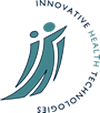IHT Annual Meeting 2003
2nd Annual Meeting 29-30 October 2003
Hamilton House, London
"Engaging with Policy"
The Programme's second Annual Conference held at Hamilton House in London, brought together all 31 projects and representatives from health policy, charity and clinical delivery sectors. The main objective of the event was, as its title - 'Engaging with Policy' - suggests, to explore the ways in which programme results might be used to inform policy, at local/regional, national and international levels. The invited guests included members from the Department of Health, the Information Authority, the Office of Science and Technology, the Royal Pharmaceutical Society, the BioIndustry Association, Genetics Interest Group and the Genetics and Insurance Committee. The full list of participants is attached to this report.
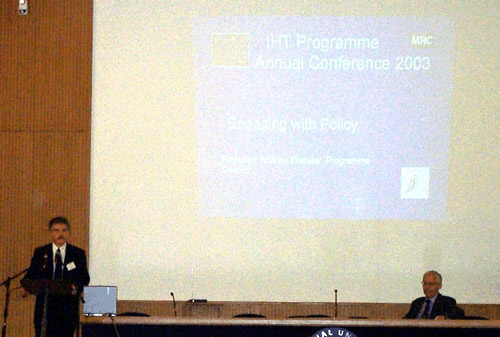
Andrew Webster, Programme Director
The Programme Director, Andrew Webster, gave a broad overview of the ways in which the Programme and individual project activity were making strong links to policy end users. His presentation can be found here - pdf. Projects are now completing publication of their first results and findings are being posted on the IHT web site. He stressed how research can have an immediate local impact through the close engagement of IHT research teams with user groups in their immediate community or region. Engagement does not, in other words, need to be defined solely through reference to the formal policy domain, and indeed could be much quicker where findings were taken up locally and often informally through networks of users who had worked with the research team. Three good examples of this are the projects at Sheffield, Glasgow and Manchester, respectively about hospice care, HIV therapies and hip joint replacement. Formal policy engagement at national or international levels typically requires linking results to pressing issues of the day or, perhaps more productively, to longer term strategic policy where a more considered and reflexive approach to health research and delivery is possible.
Webster identified two broad themes in the Programme that many of the projects are pursuing and that have such longer-term implications for policy at national level: genetics and informatics. For example, the Programme had submitted a detailed commentary on the recent NHS White Paper, Our Inheritance, Our Future that offered a series of recommendations and suggestions with regard to implementation of genetic tests, screening and diagnostics in the health service. These would be explored further through collaboration with the DoH, especially via debate over appropriate health service delivery. In a similar fashion, the Programme had begun to bring together its findings in the broad field of informatics and information seeking, and offered a critically informed analysis of the experience, value and likely long-term effect of new information systems, such as NHSDirect.
Both areas are framed by policy discourse as empowering of the patient or at least as 'patient-centric', yet depend on technology platforms that presume some degree of standardisation and a delivery algorithm that has to handle the contingencies of heterogeneous patient or client interests and practices. Users are both disciplined by yet must self-regulate their engagement, understanding and use of such systems, a complex process of governance that was later to inform much of the conference debate. These different 'technologies of citizenship' carry and create rights and obligations for the self as both subject and object of new health technologies.
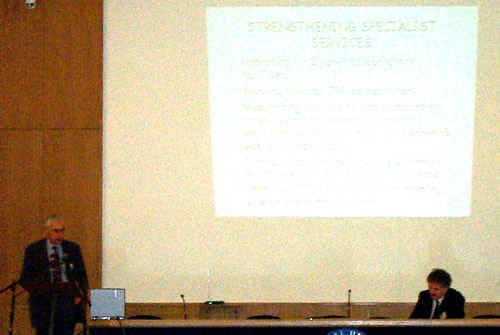
Peter Greenaway, Deputy Director of Genetics in the Department of Health
Following Webster's introductory paper, the first of two invited guest lectures was given by Dr Peter Greenaway, Deputy Director of Genetics in the Department of Health, responsible for the coordination of the Department's genetics policy, and also a member of the IHT Programme's Advisory Committee. In his paper, which is available here - pdf, he argued that the NHS would need to engage fully with genetics if it were to derive the benefits from it in terms of being able to predict, manage and cure disorders that had a genetic basis. He believed that the models for managing single gene disorders would have some value in the management of multifactorial disease. As such genetic testing would increase to cover a wide range of disorders, and would thereby require a sound organisational infrastructure that would be able to handle more tests, more quickly and more effectively. Clinicians and genetic counsellors would need much more training if they were to handle the complex differences between risk and genetic susceptibility measures, while the public would need to be reassured of the value of genetics in health care.
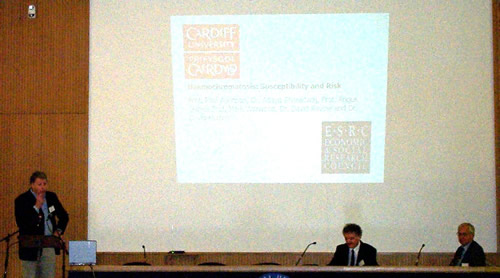
Lindsay Prior, Cardiff School of Social Sciences
The points raised by Dr Greenaway's paper prompted lively debate during a subsequent Panel session, which is summarised below. Following his paper, there was a jointly prepared contribution, available here - pdf, from Professor Lindsay Prior and Dr Adi Bharadwaj, which summarised a number of findings and themes emerging from their ongoing projects. Lindsay focussed especially on the genetics diagnostics practices within and the users' experience of clinical genetics and screening services. The interpretation and management of risk involves a highly uncertain process, and the eventual determination of risk and susceptibility cannot be regarded as always stable and secure. He pointed out, for example, that in the clinic, different computer-based diagnostic programmes will produce quite different calculations of risk depending on the population base they presume, such that the same person may be diagnosed with a high or low level of risk. He noted too that there can be a strong divergence between lay and expert interpretations of the meaning of risk, with some who have been diagnosed as being of low susceptibility and so requiring no further review, are often dissatisfied and seek continued monitoring. Those, on the other hand, who do receive monitoring on a regular basis, can derive a false sense of security. Clearly, such different responses could create unanticipated demands on the health system, and raise questions about effective use of resources. This is an important area for consideration when implementing the White Paper.
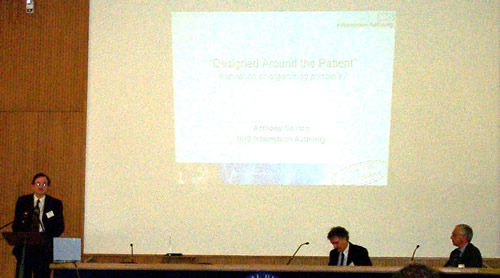
Anthony Nowlan, National Health Service's Information Authority
The meeting then moved to an examination of informatics. Anthony Nowlan, from the NHS's Information Authority, provided a very useful overview of the new plans for the development of a national 'information spine' that would be 'designed around the patient', providing integrated care that is not simply defined in terms of what happens in the clinic. Dr Nowlan's paper is available here - pdf. He recognised the difficulties of operationalising the notion of patient-centred , especially, as noted above, this meant both patient serving and patients as defining and to some degree meeting their own needs, as 'resourceful' individuals.
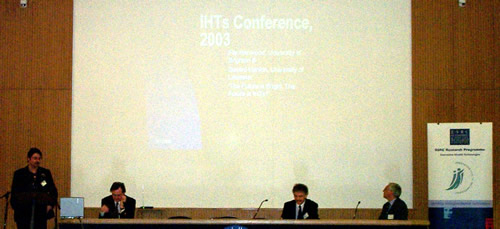
Gerry Hanlon, Organisational Sociology, University of Leicester
In the IHT paper that followed, Professor Gerry Hanlon gave a summary of the shared themes emerging from his and Dr Flis Henwood's separate projects on NHSDirect and information seeking on the web respectively. Among the key findings he reported, his paper, available here - pdf, drew attention to the ways in which the meaning of 'health', the determination of symptoms and disorders are all co-constructed or jointly produced by health professionals and users. The technological media - such as NHSDirect - people use is configured within existing social relationships (e.g. of the family) and requires different forms of information literacy to be deployed effectively. Crucially, information must be 'made sense of' and this is not simply a cognitive but also a socio-cultural process involving attributions of trust, risk and personal responsibility. Making sense is in this way a form of accountability that enshrines conceptions of governance and regulation at the micro level. As with Lindsay Prior's presentation, Gerry stressed that the resourceful patient may also be a resource-hungry patient or user of systems and that we should be cautious of claims that information platforms such as NHSDirect replace conventional expert/lay consultation.

The Panel from Left to Right
Anthony Nolwan, Gerry Hanlon, Lindsay Prior, Bill Maton Howarth
Andrew Webster, Dianne Kennard, Peter Greenaway
In the final session, a broad panel was convened of speakers and two other guests, Dr Dianne Kennard and Dr Bill Maton-Howarth, both from the DoH. Dr Kennard has been a key member of the DoH's genetics implementation team and stressed how there was much yet to be done not only in regards to the science of genetics but also in determining how health service delivery of genetic services could be most effectively managed. She suggested that some of the key issues centred around the precision and accuracy of medical diagnosis, the various algorithms on which risk assessments were made and where the balance between certainty and uncertainty would best lie. Peter Greenaway suggested that genetics should allow for the 'augmentation' of existing diagnostic services, though Lindsay Prior suggested that his evidence pointed to GPs being unlikely to manage genetic testing, preferring to refer to centralised services instead. Eileen Neilson from the Royal Pharmaceutical Society raised the wider question of how genetics services would encompass pharmacy practices, especially in the management of chronic disease and drug therapy where pharmacogenetics places more responsibility on pharmacists.
Among the other key points raised in regard to genetics, delegates stressed the importance of the perception of risk, for example, the importance of the perceptual distinction between the risk one might get compared with the risk that one might have a particular genetic disorder. This relates to issues about cultural perception and judgements and not only about clinical measures of susceptibility, penetrance and gene-gene, gene-environment interaction. We are also likely to see the multiplication of risk classifications through the embedding of genetics in the NHS, and these will need to be managed and monitored in ways that translate predictive calculations into useful and cost-effective interventions. As Peter Greenaway said, we need to develop a better understanding of the sociology of genetics if these questions are to be resolved.
Bill Maton-Howarth argued that the continuing development of information services would at some stage require the integration of genetic and other clinical data on a single Electronic Patient Record, recognising that, given that genetic material might be unstable, this would need to be done with care. Anthony Nowlan argued too that there needed to be a much stronger connection between the (social science) ICT research base and policy domain, in order to address this and other questions relating to trust, dependability and public confidence. More generally, it was accepted too that the planned information spine would have to be constructed such that it would not reproduce current social inequalities in terms of the information resources it made available.
The Conference then moved into a second period for internal discussion about planned publications from the Programme and a series of reports on the IHT's Evaluative and Comparative International Travel Fellowships, with presentations from Lisa O'Malley on her trip to Toronto, Canada to explore work on health information seeking, Brian Salter on his proposed trip to Europe to track ethical and regulatory discourse on biotechnology, and Marsha Rosengarten on her visit to Australia to examine HIV/AIDS policy there in contrast to the UK, adding value to her project with Paul Flowers and his team. Marsha's final report is available here - pdf.
The Conference closed with the Programme Director outlining plans for the annual 2004 meetings, which are intended to be directly linked to practitioners, patient and client groups including those that have close ties to particular linked projects, with a focus on 'engaging the user' rather than as in 2003 with the formal policy arena.
A list of participants can be found here - pdf.
